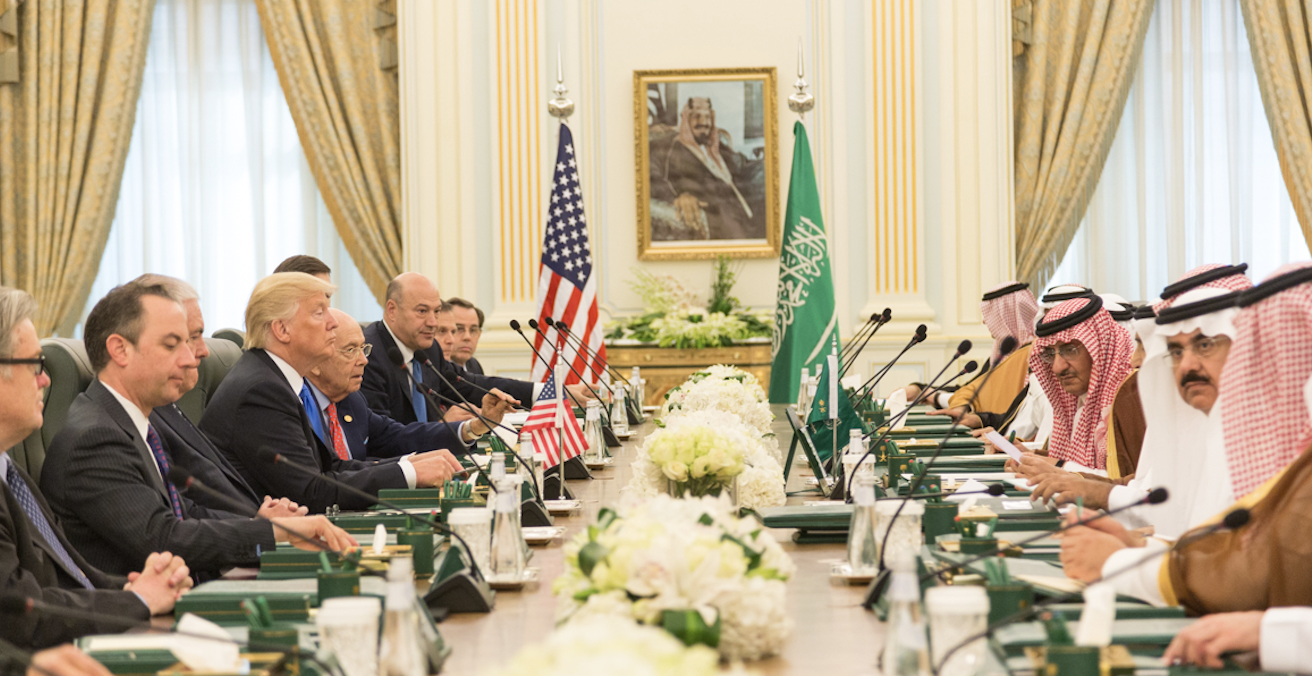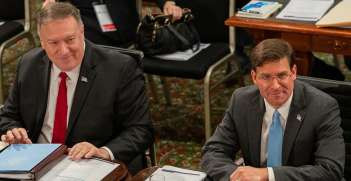Recalcitrant Qatar: Riding Out the Blockade

Qatar has defiantly resisted the blockade imposed by Saudi Arabia and neighbouring Gulf states for nearly two years. The complex demands of the Saudi-led bloc and the conflicting personalities of the Gulf monarchs mean the dispute is unlikely to end anytime soon.
In June 2017 a Saudi Arabia-led four-nation bloc, also comprising the United Arab Emirates (UAE), Bahrain and Egypt, imposed severe punitive measures and demands on Qatar to force it to abandon its “recalcitrant ways” and to accept Saudi leadership and domination of security and foreign policy in the Gulf region.
Qatar has successfully defied those measures, politically and economically, and in doing so has challenged Saudi Arabia’s leadership and its policies. It has done this independently of the broader regional audiences that share some of the bloc’s concerns. The events have also exposed and added to growing disunity amongst Arab states. But personalities, especially those of the senior royals in Qatar, Saudi Arabia and the UAE will determine reconciliation.
Punitive measures: a blockade plus
Qatar’s “independence” has been a progressive irritant to the bloc, especially the Saudis, and other regional states for well over a decade. Many observers assessed this defiance to conform would inevitably trigger some form of punitive action, which it did. Several sources claim the bloc initially considered the option of invading Qatar but instead settled on the land, sea and air blockade imposed on 5 June 2017. Other actions included: severing or downgrading of diplomatic relations by the bloc and other states; expelling Qatar from the Saudi-led coalition fighting the Houthi in Yemen; and, according to Qatari sources, intensifying a deliberate campaign of “influence” and disinformation across various media outlets, aimed at denigrating Qatar’s regional and international image.
The bloc’s 13 demands
Shortly after the blockade began, the bloc issued 13 demands that Qatar must comply with in order to restore normal relations. In summary, these included: severing all ties and funding for terrorist, sectarian and ideological groups; downgrading relations with Iran; ceasing military cooperation with Turkey and closing the newly established Turkish military base in Qatar; shutting down Al Jazeera and other affiliated media outlets; and ceasing “interference” in the internal affairs of the bloc states. Qatar was given ten days to comply and was requested to accept regular compliance monitoring – monthly for the first year, quarterly for the second and annually for ten years thereafter. Qatari sources claim these demands were drafted by the UAE.
Foreknowledge and response
It is certain Qatar knew in advance most of the detail of the bloc’s plans and had made contingency plans in the event they were implemented. Some sources believe Saudi Arabia was emboldened to trigger the blockade after President Donald Trump visited Riyadh in late-May 2017 and allegedly gave in-principle support for Qatar to be reined in. That support, reportedly, was given without the prior knowledge of Trump’s senior advisers.
The decision by Gulf Cooperation Council (GCC) members Oman and Kuwait not to join the blockade, and their unsuccessful attempts at mediation, suggests strong Gulf-state disunity over the bloc’s actions. Senior US officials, including then-US Secretary of State Rex Tillerson and then-Defence Secretary James Mattis, also responded quickly to protect US interests and mediate the blockade, but with mixed results. They failed to prevent or lift the blockade. However, Qatari sources claim while US relations with Qatar remain strong, US reliability under Trump is no longer assumed.
An insult to sovereignty
Officials in Doha viewed the blockade and the 13 demands as a direct challenge to Qatar’s sovereignty and right of independent decision-making. But the wording of the demands, and particularly the timeline and ten-year monitoring process, were seen as blatantly insulting. Given these factors, and the personality factors to be outlined below, achieving reconciliation will be very difficult.
Economic and human factors
In the 20 months since the blockade, Qatar has successfully found sustainable solutions to almost all the economic effects of the blockade. In their words, they have “defeated the blockade.”
One of Qatar’s immediate priorities was to arrange alternative sources of critical supplies – particularly fresh foodstuffs, most of which had previously been imported from Saudi Arabia. Despite initial concerns, they succeeded in doing so. Qatar also initiated, and still maintains, a program to review or develop the option of establishing key domestic industries. A domestic, albeit basic, dairy industry is one of these. Regarding air services, Iran and Turkey immediately offered new overflight routes to facilitate Qatar Airways access to northwest Asian states and Europe. Iran, Oman and Kuwait also offered alternative port facilities to those denied by bloc countries.
Two major on-going disruptions of the blockade are the movement of people between Qatar and the bloc countries, including family reunions, and pilgrimages to Saudi Arabia. Qatari business investments in bloc countries, particularly those that exported to Qatar, remain significantly affected.
Geopolitical
Qatar dismissed the 13 demands as containing incorrect assumptions or being neither reasonable nor actionable. They strongly deny supporting terrorist groups but defended supporting many then-legitimate populist Islamist organisations in regional countries during the Arab Spring, including the Muslim Brotherhood in Egypt and other states. They also defend allowing safe residence for exiled or other members of organisations, where such organisations were later banned, but assert they do not support Qatar being used as a base to subvert foreign governments. In the case of Hamas, they assert their financial support is to fund, via Israel, the salaries of government officials in Gaza for humanitarian reasons, not to support Hamas as a political party.
They also assert they agreed to the establishment of a Taliban office in Doha in 2013, with US agreement, to facilitate the Afghan reconciliation process, not to support the Taliban itself.
Qatari officials have described their relationships with Iran and Turkey as pragmatic. Both Iran and Turkey were amongst the first states to condemn the blockade and offer unsolicited support to Qatar. Iran and Qatar share a common maritime boundary and the world’s largest natural gas field in the Persian Gulf. The two countries have their policy differences – for example, Qatar opposes Iranian support to Syria’s Assad regime and instead supports the anti-Assad forces. Qatar also hosts US Central Command’s Forward HQ at the US Al Udeid air base, the largest in the Middle East. This would be the centre of US military operations against Iran in the event of hostilities, and a target of Iran in such circumstances. How comfortably that fits with Qatar-Iran and Qatar-US relations is a matter of some speculation.
The Qatar-Turkey relationship is strong and underpinned by a sound personal relationship between Qatar’s Emir Sheikh Tamim bin Hamad Al Thani and Turkey’s President Recep Tayyip Erdogan. Their 2014 agreement to establish a small Turkish military base in Qatar of up to 3,000 troops serves the mutual interests of both – diversity for Qatar, and for Turkey its goal of expanding its influence in the Middle East, which, in part, conflicts with bloc state interests.
Al Jazeera
Qatar has refused consistent pressure to close down or muzzle Al Jazeera’s “objective reporting” on the region and other states. As one Qatari put it, AJ is the most respected media source in the Middle East and plays a key role, regionally and internationally, in ensuring public awareness about the activities and implications of regional states, whatever their sensitivity; any restrictions are simply not negotiable.
Personalities
Several sources attribute the bloc’s confrontation as being as much about the personalities of the Qatari, Saudi and UAE ruling royals as about geopolitical issues. It is not possible to confront the state on these issues without personally confronting the monarch. For its part, Qatar has sought to reciprocate the Saudis. Qatar’s Emir Sheikh Tamim did not attend December’s GCC meeting in Riyadh hosted by Saudi Arabia’s King Salman bin Abdulaziz Al Saud (all other GCC heads of state attended) and on 1 January Qatar withdrew from the Saudi-led Organisation of Petroleum Exporting Countries but denied the blockade was the cause. For similar reasons, Qatar is not expected to join, or rejoin, any Saudi or UAE dominated regional organisation in future, including the proposed Middle East Strategic Alliance (MESA), but will remain a member of the GCC.
Reconciliation
Given the entrenched personality factors involved, sources speculated reconciliation could require a change of leadership. Given the ages of the key royals, Qatar’s Sheikh Tamim is 38-years old, Saudi Crown Prince Mohammad bin Salman is 33-years, and UAE Crown Prince Mohammad bin Zayad is 58-years, reconciliation could be a long wait.
Ian Dudgeon is a presidential associate of the AIIA and recently visited the Middle East
This article is published under a Creative Commons License and may be republished with attribution.





